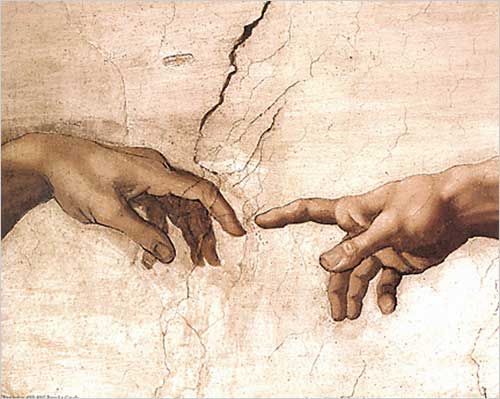We run our website the way we wished the whole internet worked: we provide high quality original content with no ads. We are funded solely by your direct support. Please consider supporting this project.

Crucified Transcendence
If our thinking about God is to be faithful to the New Testament, then all of our thinking about God must, from beginning to end, be centered on Christ. I’m persuaded that even our thinking about God in his transcendent, eternal state should begin and proceed with the Pauline conviction that we know nothing “except Jesus Christ, and him crucified” (2 Cor. 2:2).
If no one knows the Father except the Son, whose identity and mission is thematically centered on the cross (Mt 11:27), and if the crucified Son is the one and only exact representation of God’s essence (Heb 1:3) and the one and only Word and image of God who has “made God known” by revealing “truth and grace” (Jn 1:14), then doesn’t it make sense to bracket out, as far as possible, our preconceived, a priori assumptions about what we think God’s transcendence ought to look like and to then reflect on God’s transcendence with our eyes firmly fixed on him? More specifically ought we not look to the cross to understand who God is in his eternal transcendent nature?
Of course, the identity and meaning of the crucified Christ is not self-contained or self-interpreting. It’s not as though the Incarnation and Crucifixion would have meant the same thing if they had taken place in (say) ancient Babylon, Egypt or India. Rather, the meaning of the Incarnation, Crucifixion and every other aspect of Jesus’ identity and mission are inextricably wrapped up with the OT narrative. As contemporary biblical scholarship has increasingly affirmed, the meaning of everything Jesus was about is thoroughly anchored in his Jewishness.
When I claim that we should adopt the conviction that we in principle know nothing “except Christ crucified” as we reflect on God’s transcendence, therefore, it should be understood that I am presupposing rather than eliminating the biblical history and covenantal framework that infuses “Christ crucified” with the particular, very Jewish, meaning it has. Indeed, this is precisely why the revelation of God is a distinctly Trinitarian event, involving the transcendent Father who is revealed in the incarnate Son through the illumination of the indwelling Holy Spirit.
By suggesting that we should in principle know nothing “except Christ crucified” as we reflect on God’s transcendence, I am contending that we should allow no other source to inform our understanding of the nature and character of God’s transcendence. It is true that because God is triune, there is more to be said about God than what has been revealed by the crucified Christ, but even this “more,” I contend, is known only through the crucified Christ.
Those from a more commonly held view of God—one that is shaped by the classical theological perspective—may argue that we can’t anchor an understanding of God’s transcendence in the incarnate and crucified Christ, since the incarnate and crucified Christ reflects God accommodating himself to human limitations and sin. But this is precisely the problem with the classical theological perspective. Because it operates with a concept of transcendence that is derived from outside God’s revelation in Christ, it can never fully embrace that God’s accommodation in Christ is actually the quintessential revelation of God. In other words, the revelation of Christ crucified reveals God’s transcendent essence. The only way to bridge God’s transcendence and God’s accommodation in Christ is to never allow for a separation in the first place. Hence the incarnate and crucified Christ is at one and the same time the quintessential source for our understanding of God’s accommodation as well as of God’s transcendence.
Category: General
Tags: Classical Theism, Cruciform Theology, Nature of God, Transcendence, Trinity
Topics: Attributes and Character
Related Reading

Podcast: Where Does Forgiveness Fit in a Cruciform Theology?
Greg offers looks at forgiveness in a realm of natural consequences. http://traffic.libsyn.com/askgregboyd/Episode_0298.mp3

The Greatest in the Kingdom (2 of 2)
Article by Natalie Frisk This post is a summary of what was discussed at the ReKnew CrossVision Conference in regard to what and how we teach our kids about the cruciform hermeneutic. Taking Jesus into the Old Testament I co-lead a family-friendly home church where we sometimes get into spiritually deep conversations with children. There…

How God Judges Sin
In his third sermon covering material from his book Crucifixion of the Warrior God, Greg explores the topic of judgment. In this clip, Greg suggests that while God certainly does judge sin, how he judges is very different than we might expect. You can view the entire sermon here on the Woodland Hills Church site. You can find the…

Does Paul Condone Vindictive Psalms? A Response to Paul Copan (#1)
In a recent paper delivered at the Evangelical Theological Society, Paul Copan raised a number of objections against my book, Crucifixion of the Warrior of God. This is the first of several blogs in which I will respond to this paper. (By the way, Paul and I had a friendly two-session debate on Justin Brierley’s…

God’s Non-Violent Ideal in the OT
While God condescended to working within the violent-prone, fallen framework of his people in the Old Testament—as I argue in Crucifixion of the Warrior God—the OT is also full of references to how God worked to preserve his non-violent ideal as much as possible. He did this by continually reminding his people not to place…

Quotes to Chew On: The Cross and God’s Love
“The cross is the central way Christ images God. Christ was not an innocent third party who was punished against his will to appease the Father’s wrath. Christ is himself God, and he voluntarily took our sin and its just punishment upon himself. Hence his sacrifice does not appease God’s wrath; it reveals God’s love.…
